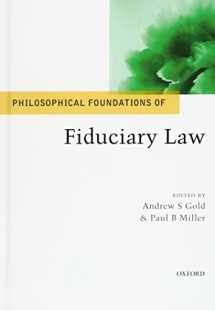
Philosophical Foundations of Fiduciary Law (Philosophical Foundations of Law)
Book details
Summary
Description
Fiduciary law is a critically important body of law. Fiduciary duties ensure the integrity of a remarkable variety of relationships, institutions, and organizations. They apply to relationships of great personal significance, including in some jurisdictions the relationship between parents and children. They structure a wide variety of commercial relationships, and they are essential to the regulation of relationships between professional service providers and their clients, including relationships between lawyer and client, doctor and patient, and investment manager and client. Fiduciary duties, perhaps uniquely in private law, challenge traditional ways of marking the boundaries between private and public law, inasmuch as they figure prominently in public governance. Indeed, there is even a storied tradition of thinking of the authority of the state in fiduciary terms.
Notwithstanding its importance, fiduciary law has been woefully under-analyzed by legal theorists. Filling this gap with a series of chapters by leading theorists, this book includes chapters on: the nature of fiduciary relationships, the connection between fiduciary duties and morality, the content and significance of fiduciary loyalty, the economic significance of fiduciary law, the application of fiduciary principles to public law and international law, the import of fiduciary relationships to theories of authority, and various other fundamental topics in the field. In many cases, new and important questions are raised by the book's chapters. Indeed, this book not only offers a much-needed theoretical assessment of fiduciary topics, it defines the field going forward, setting an agenda for future philosophical study of fiduciary law.


We would LOVE it if you could help us and other readers by reviewing the book
Book review



